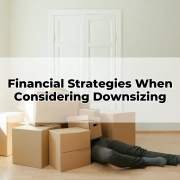Is downsizing a good idea for retirement?
Table of Contents
ToggleAs you approach your golden years, making informed decisions about your retirement becomes more crucial than ever. One significant consideration that often arises is whether downsizing your home is a wise move for your retirement journey.
Picture this: you’ve spent years in a house that’s been the backdrop to countless memories. But now, with retirement on the horizon, you’re faced with choices that could reshape your financial landscape. Should you stay in your current home, or is it time to consider a smaller, cosier abode? We’re here to help you navigate these decisions, providing insights into the potential benefits and challenges of downsizing.
Downsizing isn’t just about moving to a smaller space; it’s a strategic step that can impact your financial security, lifestyle, and overall happiness. Our mission is to equip you with the knowledge you need to make an informed choice—one that aligns with your goals and aspirations for retirement.
In this blog post, we’ll explore the financial advantages of downsizing, like how it can free up funds for your retirement dreams and help you embrace a more manageable lifestyle. We’ll also delve into the emotional side of downsizing, recognizing that leaving a beloved home isn’t just about the bricks and mortar—it’s about the memories and attachments that come with it.
Benefits of downsizing
As you plan for your retirement, the idea of downsizing your home might be enticing. But what exactly are the benefits of downsizing, and how can it positively impact your retirement years?
Financial freedom
One of the most significant benefits of downsizing is the potential for increased financial freedom. Moving to a smaller home often means lower mortgage payments, reduced property taxes, and decreased utility bills. Imagine having extra funds each month that you can redirect toward your retirement savings, travel plans, or simply enjoying life to the fullest.
Unlocking home equity
Over the years, your home may have appreciated in value, building up valuable equity. By downsizing, you can tap into this equity and use it to enhance your retirement nest egg. This extra financial cushion can be invested to generate income, cover unexpected expenses, or fulfil your retirement dreams.
Simplified lifestyle
A larger home often comes with more maintenance, cleaning, and general upkeep. Downsizing allows you to embrace a simplified lifestyle, giving you more time and energy to focus on the things you truly enjoy. Say goodbye to the stress of managing a big property and hello to a more carefree way of living.
Flexibility and mobility
With a smaller home, you gain greater flexibility and mobility. You might choose to move to a new location that better suits your retirement desires, whether it’s closer to family, friends, or a serene beachfront. A downsized home can empower you to explore new horizons and make the most of your retirement years.
Reduced clutter
Downsizing encourages you to declutter and let go of possessions that you no longer need or use. This process can be liberating, leading to a more organised and serene living environment. It’s a chance to surround yourself only with items that hold sentimental value or practical purpose, creating a living space that truly reflects your current lifestyle.
Environmental impact
A smaller home typically requires fewer resources to maintain and heat, which can have a positive impact on the environment. If sustainability is important to you, downsizing can align with your values by reducing your carbon footprint and conserving resources.
Emotional freedom
Letting go of a larger home can be emotionally challenging, but it can also offer a sense of emotional freedom. Downsizing encourages you to focus on the present and future, rather than being tied to the past. It’s an opportunity to create new memories and experiences in a space that’s more aligned with your current life stage.
As you consider these advantages, remember that the decision to downsize should align with your unique goals and aspirations for retirement.

Emotional and lifestyle factors
Deciding whether to downsize for retirement isn’t just about numbers and finances—it’s also a journey that involves your emotions and lifestyle preferences.
Saying goodbye to the familiar
Your current home holds memories of life’s milestones, from raising children to hosting family gatherings. Downsizing can evoke mixed emotions as you consider leaving behind a place that’s been a significant part of your life. It’s essential to acknowledge these feelings and give yourself time to adapt to the idea of a new living space.
The "Empty Nest" phase
For many retirees, downsizing coincides with the “empty nest” phase, where children have moved out and started their own lives. While this transition can be bittersweet, it also opens the door to new opportunities and adventures. Downsizing can help you embrace your evolving role as a parent while nurturing your own dreams and aspirations.
Creating a cosy haven
Transitioning to a smaller home can inspire you to create a cosy and inviting haven that caters to your current needs. Consider how you can personalise your new space to reflect your style and preferences. Whether it’s adopting a minimalist design or incorporating cherished items, your downsized home can become a reflection of your unique personality.
Letting go of possessions
Downsizing requires making choices about what possessions to keep, sell, donate, or pass on to loved ones. While it can be challenging to part with belongings that hold sentimental value, remember that it’s an opportunity to declutter your life and make space for new experiences. Prioritise items that truly enrich your life and let go of things that no longer serve you.
Embracing a simpler lifestyle
Smaller living spaces encourage a simpler lifestyle, where you focus on what truly matters. Embrace the chance to live with intention and mindfulness, making room for activities that bring you joy and fulfilment. From pursuing hobbies to spending quality time with loved ones, downsizing can empower you to savour life’s meaningful moments.
Redefining social connections
Downsizing might involve moving to a new neighbourhood or community. While this can be daunting, it also offers the opportunity to build new social connections and expand your horizons. Research local clubs, events, and activities that align with your interests to ensure a smooth transition into your new social environment.
Navigating change together
If you’re downsizing as a couple, it’s essential to communicate openly and support each other throughout the process. Understand that both partners might have different emotional responses to downsizing, and creating a united vision for your retirement can help ease any apprehensions.
Downsizing is more than just changing your address—it’s about embracing a new way of living that aligns with your current desires and goals.
Considerations before downsizing
Before embarking on the downsizing journey, it’s crucial to evaluate various factors to ensure that the decision aligns with your needs and goals.
Local real estate market
Research the current real estate market in your area. Are property prices rising or falling? Understanding the market trends can help you gauge the potential value of your current home and determine if it’s the right time to sell.
Financial implications
While downsizing can offer financial benefits, it’s essential to crunch the numbers. Consider the costs of selling your current home, such as real estate agent fees, legal expenses, and potential repairs. Balance these against the potential savings and equity release from downsizing.
Moving expenses
Moving to a new home, even a smaller one, comes with its own set of costs. These can include hiring professional movers, transportation, packing supplies, and potential storage fees. Factor in these expenses when evaluating the financial impact of downsizing.
Impact on social connections
Consider the effect of your move on your social connections. Will you be moving away from friends, family, or community activities that you value? Balancing the desire for a new living space with the need for social support is essential.
Lifestyle requirements
Assess your current lifestyle needs and how they align with a downsized home. Do you have hobbies that require extra space? Will a smaller kitchen still accommodate your culinary adventures? Ensure that your new space meets your day-to-day needs.
Future Planning
Think about your long-term plans. Will the downsized home be suitable as you age and your mobility needs change? Consider accessibility features that might be important down the line.
Sentimental attachments
It’s natural to feel attached to your current home due to sentimental reasons. Take time to reflect on the memories and emotions tied to your space. Consider whether downsizing aligns with your emotional readiness to part with these attachments.
New location, new lifestyle
If you’re considering moving to a new area, research the community thoroughly. Does it offer the amenities, services, and lifestyle you’re seeking in retirement? Visit the neighbourhood, interact with locals, and immerse yourself in the environment before making a decision.
Timing and timing right
Timing is everything. Consider whether your current life stage and circumstances are conducive to downsizing. For example, if you’re about to retire, downsizing might align well with your transition into a new phase of life.
Professional guidance
Navigating the intricacies of downsizing can be overwhelming. Seeking guidance from a financial adviser, real estate agent, or legal expert can provide you with valuable insights and ensure that you make well-informed decisions.
Remember, downsizing is a significant step that should be tailored to your unique circumstances.

Alternative options of downsizing
While downsizing can be a fantastic choice for many, it’s essential to explore alternative strategies to make an informed decision that suits your retirement goals.
Renting a smaller home
Rather than selling your current property, you might choose to rent a smaller home. Renting provides flexibility and eliminates the need to worry about property maintenance and market fluctuations. It’s an option worth exploring, especially if you’re uncertain about committing to a permanent downsizing move.
Reverse mortgages
Reverse mortgages allow you to tap into your home’s equity while still living in it. This can be a viable option for generating additional income during retirement. However, it’s essential to understand the terms, potential fees, and impact on your estate before pursuing this route.
Home equity release schemes
Similar to reverse mortgages, home equity release schemes provide you with funds by using your property’s equity. These schemes can offer financial relief while allowing you to remain in your home. Just like with reverse mortgages, be sure to comprehend all the terms and implications.
Rightsizing
Rightsizing involves moving to a home that is better suited to your current needs, rather than strictly downsizing. It might mean moving to a property with more functional space for your hobbies or hosting family, without necessarily opting for a smaller home.
Co-housing or shared living
Co-housing or shared living arrangements involve living with others in a communal setting. This option can provide companionship, cost-sharing benefits, and a supportive community, which can be particularly appealing in retirement.
Staying put with modifications
If you have a strong emotional attachment to your current home, you might consider making modifications to enhance its suitability for retirement. This could involve adding accessibility features, creating multifunctional spaces, or upgrading energy-efficient amenities.
Second home or vacation property
Some retirees choose to purchase a second home or vacation property as an alternative to downsizing. This option allows you to maintain your primary residence while enjoying a change of scenery during holidays or extended breaks.
Financial investments
Instead of focusing solely on your home’s equity, consider other financial investments that can support your retirement goals. Working with a financial adviser can help you explore diverse investment options that align with your risk tolerance and financial aspirations.
Renting out a portion of your home
If your current home has extra space, you could consider renting out a portion to generate additional income. This approach can provide financial support while allowing you to remain in your familiar surroundings.
Delaying decisions
Sometimes, delaying the decision to downsize can be a strategic choice. It gives you more time to evaluate your options, financial landscape, and personal preferences before making a move.
The right path for your retirement will depend on your unique circumstances and aspirations. Each of these alternative options comes with its own set of pros and cons. Take the time to carefully assess which option aligns best with your financial, emotional, and lifestyle goals.
Financial Implications of downsizing
When considering downsizing your home for retirement, it’s crucial to understand the potential financial impact of this significant decision.
Proceeds from selling your home
Selling your current home is likely to be the primary source of funds for your downsizing move. Estimate the potential proceeds by subtracting selling costs (such as real estate agent commissions and closing costs) from the expected sale price. This sum can contribute to your retirement savings or other financial goals.
Home equity release
The equity you’ve built in your current home can be released through downsizing, providing you with a lump sum of money. This equity can be reinvested, used to cover expenses, or contribute to your retirement income. Be sure to calculate the amount of equity you’ll be able to access.
Tax implications
Consult a tax professional to understand the potential tax implications of selling your current home and purchasing a new one. Tax rules vary depending on factors like your age, the length of time you’ve owned the property, and changes in property value.
Retirement savings impact
Evaluate how downsizing will affect your overall retirement savings. Will the funds you receive from selling your home substantially boost your retirement nest egg? Consider whether this aligns with your financial goals and long-term plans.
Maintenance and utilities savings
Downsizing often results in reduced maintenance and utility costs, freeing up extra funds in your monthly budget. Calculate the potential savings and factor them into your overall financial picture.
Transition costs
Don’t forget to account for the costs associated with moving to a new home. Expenses might include moving company fees, packing materials, and potential renovations or upgrades in the new space.
Impact on pension and benefits
Depending on your location and circumstances, downsizing could influence your eligibility for certain pensions or government benefits. Research how the change in your financial situation might affect your entitlements.
Future housing costs
Consider the ongoing costs of your downsized home, such as property taxes, homeowners association fees, and potential renovations. Ensure that your new housing expenses align with your budget.
Investment opportunities
The funds released from downsizing can be strategically invested to generate income during retirement. Discuss your investment options with a financial adviser to maximise the potential returns on your downsizing move.
Quality of life
While financial considerations are crucial, remember to assess the overall quality of life that downsizing can offer. A more manageable living space and reduced financial stress can contribute to a higher quality of life in retirement.

As you move forward, we encourage you to take the time to reflect on what matters most to you. Whether it’s achieving greater financial security, embracing a simpler lifestyle, or making room for new experiences, downsizing is a step toward creating the retirement you’ve envisioned.









